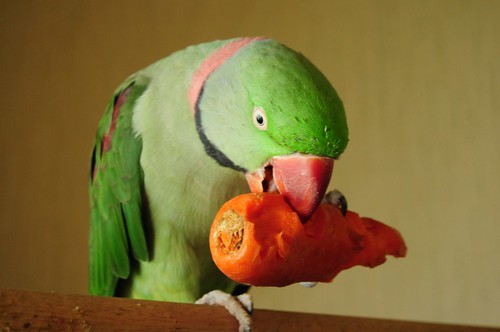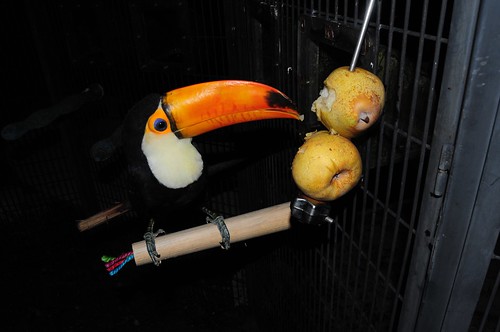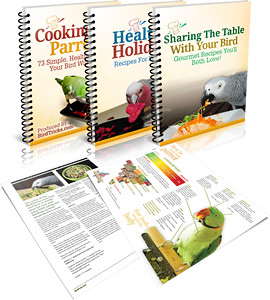
Alexandrine parrot
I hope that all of you are aware by now that a bird needs fresh produce to be the largest part of its diet. Vegetables are the food most valuable to your bird and need to be offered every day.
Of course, you want to serve the best there is to offer, which is generally organically grown produce because it is cultivated using natural pesticides, as opposed to the much more toxic and dangerous synthetic pesticides, and because organic produce is usually higher in nutrients.
Not everyone has access to organic foods, however, and those of us who do might sometimes question its freshness. Because of the higher price tag, it sometimes sits around in the store for longer than conventional produce. From a nutritional standpoint, it doesn’t make sense to buy poor quality organic food.
But then there are the pesticides to consider too. While organic foods might use natural pesticides, they are still pesticides and need to be washed from the food as well. Different crops require the use of more or less pesticides, and the type of pesticides used are different as well, some being worse than others.
This is the 2012 (released in June) listing of produce that should only be bought organically and those conventional products that require less or safer pesticides, making them a good choice. Rather than link you to the site, I thought it was wiser to modify their list to pertain only to what is safe for parrots to avoid confusion:
PRODUCE THAT SHOULD ONLY BE BOUGHT ORGANICALLY:
- Apples
- Celery
- Sweet bell peppers
- Peaches
- Strawberries
- Nectarines – imported
- Grapes
- Spinach
- Lettuce
- Cucumbers
- Blueberries – domestic
- Potatoes
- +Green beans (PLUS category – see * below)
- +Kale/Greens (PLUS category – see * below)
CONVENTIONAL PRODUCE THAT IS SAFE TO BUY:
- Sweet Corn
- Pineapples
- Cabbage
- Sweet peas
- Mangoes
- Kiwi
- Cantaloupe – domestic
- Sweet potatoes
- Grapefruit
- Watermelon
*“This year we have expanded the Dirty Dozen™ with a Plus category to highlight two crops — green beans and leafy greens, meaning, kale and collard greens – that did not meet traditional Dirty Dozen ™criteria but were commonly contaminated with highly toxic organophosphate insecticides. These insecticides are toxic to the nervous system and have been largely removed from agriculture over the past decade. But they are not banned and still show up on some food crops.
Commodity crop corn used for animal feed and biofuels is almost all produced with genetically modified (GMO) seeds, as is some sweet corn sold for human consumption. Since GMO sweet corn is not labeled as such in US stores, EWG advises those who have concerns about GMOs to buy organic sweet corn.” (Taken from the EWG’s 2012 Shoppers guide to Pesticides in Produce website)

Toco toucan
As long as you are properly washing your foods, the risks of pesticides in your bird’s food are FAR OUTWEIGHED by the nutritional benefits gained. This information is provided to help you select the best quality foods you can.
Now that you know how to make the best choices for food quality, do you what to do with the choices you have made?
This is one the biggest questions we get here at Birdtricks.com. Clients want to do the best thing by their birds, but two things generally stand in their way:
- They aren’t confident about the parrot diet. Some foods need to be cooked to be safe and some are best served raw. Some foods are toxic and shouldn’t be given at all. And then there is the question of how much of a particular food is adequate…or safe.
- Their bird will not eat the foods they offer. It is terribly frustrating to put a bowl of healthy food into your bird’s cage and have them walk away from it day after day. There are ways, sneaky ways, to get your bird the nutrition it needs.
With all the confusion and pleas for help, we decided to put together a cookbook/nutrition guide that answers all the questions you have about parrot diet and nutrition. It will also give you information that you didn’t know you needed – such as how to use diet to prevent (and even cure!) the vast majority of parrot illnesses through diet, and more additional information than I could possibly list here.
This book contains everything you must know to feed your bird properly and safely. Please take the time to check out this link and make the decision for yourself: Cooking for Parrots.




1 comment
Do you wash your fruits/veggies with cold water only or do you use some kind of veggie wash?
Leave a comment